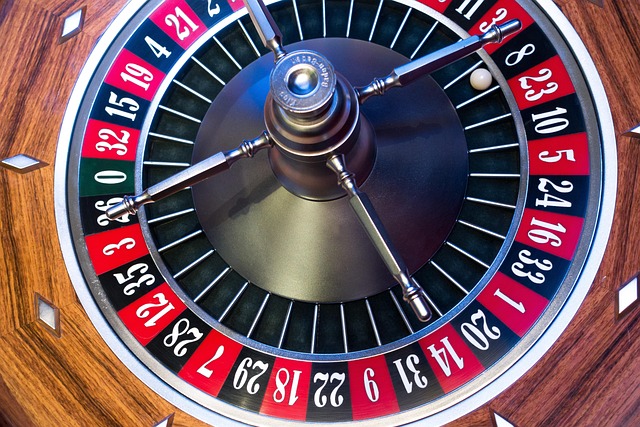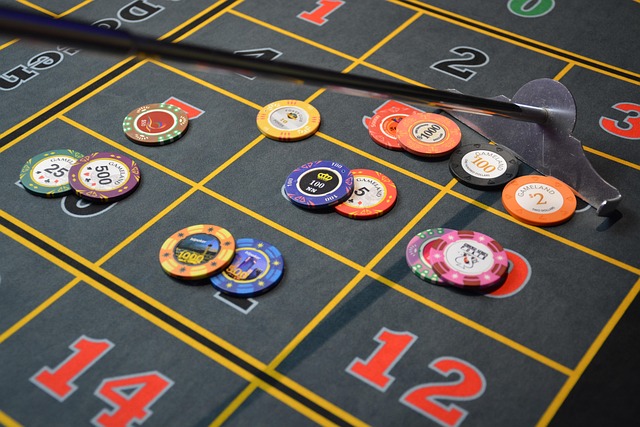Roulette Strategy revolves around understanding probability and house edge variations between game types (e.g., European vs American). By recognizing patterns in past spins, players can make informed guesses about future outcomes. Various betting systems, like Martingale, Fibonacci, Paroli, and Labouchere, offer approaches to optimize wins while managing risks. Effective strategies require tracking outcomes, understanding odds, adapting to wheel patterns, and analyzing bet performance for consistent profitability, enhancing the gaming experience.
Discover the world of roulette strategy and master the art of winning at the table. This comprehensive guide explores the ins and outs of various roulette strategies, offering insights into understanding odds and house edge. Learn about popular systems that have stood the test of time, from the Martingale to the Fibonacci. We’ll guide you through implementing and adjusting your chosen strategy for maximum success. Elevate your roulette game with these proven tactics.
- Understanding Roulette Odds and House Edge
- Popular Roulette Strategy Systems Explained
- Implementing and Adjusting Your Roulette Strategy
Understanding Roulette Odds and House Edge

Roulette is a game that heavily relies on probability and odds, making understanding the roulette odds and house edge an integral part of any winning roulette strategy. The house edge, essentially the advantage held by the casino over the player, varies based on the type of roulette played. European Roulette, for instance, has a lower house edge (2.7%) compared to American Roulette (5.26%). Knowing these odds allows players to make informed decisions and choose games that offer better value.
A key concept in any roulette strategy is recognizing that certain numbers and combinations have higher probabilities of landing. While no system can guarantee a win, understanding the wheel’s dynamics enables players to place bets with more strategic intent. By analyzing past spins and identifying patterns, players can make educated guesses about where the ball might land next, aiming to minimize losses while maximizing potential gains.
Popular Roulette Strategy Systems Explained

Roulette is a captivating casino game that has enticed players for centuries with its combination of chance and strategy. Amidst the numerous betting options, several Roulette Strategy Systems have emerged, each claiming to offer an edge over the wheel. From the classic Martingale System to the more modern Fibonacci Strategy, these systems promise to optimize winning potential.
The Martingale System, perhaps the most renowned, advocates for doubling your bet after every loss until you secure a win. This approach intensifies both potential gains and losses equally. In contrast, the Fibonacci Strategy employs a sequence of numbers from Leonardo’s famous sequence, where bettors adjust their stakes based on this pattern, aiming to capture consistent profits while minimizing risks. Other popular systems include the Paroli, which focuses on increasing bets after each win, and the Labouchere System, utilizing a series of predetermined numbers for betting decisions.
Implementing and Adjusting Your Roulette Strategy

Implementing a roulette strategy involves more than just choosing a bet type and hoping for the best. It requires careful observation, understanding of odds, and adaptability. Track your wins and losses to see what bets offer the best returns over time. For example, while straight bets might offer higher payouts per spin, outside bets like ‘red/black’ or ‘even/odd’ have slightly lower odds but appear more frequently, providing a more consistent strategy.
Adjusting your roulette strategy is key to long-term success. As you gain experience, tweak your approach based on the wheel’s behavior, table dynamics, and personal preferences. Remember, no single strategy guarantees victory; instead, it’s about finding what works best for you in any given moment, ensuring a more enjoyable and sustainable gaming experience.
Roulette strategy can be a fascinating and profitable endeavor for those willing to understand the odds and implement effective systems. By grasping the concept of house edge and exploring proven strategies like Martingale or Fibonacci, players can make informed decisions at the table. Remember, each roulette strategy has its pros and cons, so adjusting your approach based on outcomes is key. With consistent practice and a well-thought-out method, you can enhance your roulette experience and potentially increase your chances of winning.






